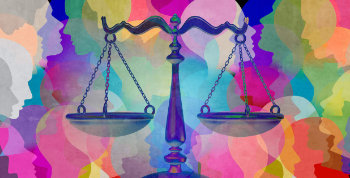
Justice
What would justice be like in a free society? How would it be implemented?
It's ignorant to think that laws prevent people from doing things. As the news shows, they don't. They just threaten harm after the fact.
Regarding the earlier question re: law in a free society, I'm sure we can agree that law today is very arbitrary, meaning, frequently calls for harm unrelated to the crime. This is obvious for victimless crimes where there is no victim and no harm (appeals to "harming society" don't count; society isn't an agent able to be harmed as such); why does distributing drugs (where "distributing" in turn just means carrying over X amount; distribution can then be assumed) net a person 10 years (not 9, or 11, or ...)? There is no rational determination; it's political, random, arbitrary, capricious even.
Furthermore, locking up a criminal doesn't necessarily do anything for the victim. There must be two elements to justice:
- retribution (visiting the harm done back on the criminal; equal infringement) and
- restoration (making whole the victim, insofar as is possible, or survivors: paying medical bills, lost work, returning stolen goods, etc.).
Note that while just response may deter other potential criminals, deterrence alone is not a moral justification for harm. (It brings to mind the story about the mother who brought her child to school for the first day and told the teacher, "If he misbehaves, don't hit him; hit the child next to him, and he'll shape up." One may argue that deterrence isn't "hitting" someone for something they didn't do; but any harm beyond what is just, in the name of "deterrence" or anything else, is in fact inflicting undeserved harm.)
“An eye for an eye” is barbaric, some would say; but responding with harm is no worse than doing it first. However, since justice is for the victim and not some arbitrary "state" which takes it upon itself to "punish" as if it were in place of a parent, the actual retribution may be negotiated by the victim/criminal and agents. For example, a victim may be satisfied with a combination of monetary payment and incarceration (at a private institution whose level of "luxury" would also be part of the agreement - bread and water could be arranged if that's what the criminal/victim agreed on). If there is no agreement, then the right to equal retribution stands as default. Nor would the victim have to carry it out himself; there would be agencies much like police but actually working for their customers, to do that.
Regarding implementation, obviously we lack a crystal ball to see the future, but can suggest what may happen. Private courts, of course, whose reputation (and hence profit) would depend on their fairness. It would be likely that most people would subscribe to some sort of "rights enforcement agency" (also called private defense agency, dispute resolution agency), which would, depending on the subscription level, perhaps patrol their neighborhood, represent them, etc. These agencies would not be special. If they broke into a house wrongly thinking that stolen goods were in it, they would be responsible for the damage just like anyone else. Since war is expensive, these agencies would have agreements on file as to which courts to use in disputes (if customers of different agencies have a problem).
It would be possible (hopefully unlikely) to be a customer of no agency, and to not agree on any private arbitration. There are various ways to deal with that, some more forceful than others.
For articles on libertarian justice, the references to this paper (not the paper itself, which is about a rather narrow claim regarding libertarian justice) are all excellent (I wrote the paper; but again, I'm saying the citations are the useful thing, not the paper itself, in this case). Much of this page is inspired by Dr. Walter Block's "two teeth for a tooth" arguments.
For a possible implementation of justice in a voluntaryist society, see references to "dispute resolution organization" or "DRO" in Molyneux's book Practical Anarchy. I'm not as strong a believer in ostracism as he is (see example "the rapist" for one of someone that does not agree to arbitration).
Also see: Introduction to Natural Law by Murray Rothbard, excerpt from The Ethics of Liberty.